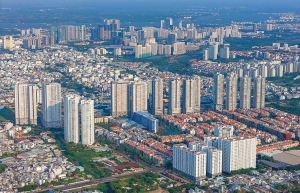INTERNATIONAL INVESTMENT
AND PORTAL
This resurgence is underscored by a sharp rise in foreign direct investment, which totalled over $21.51 billion in the first half of the year, a 32.6 per cent increase compared to the same period in 2024.
 (L-R) Seck Yee Chung, partner; and Quang Tran, senior associate Baker McKenzie
(L-R) Seck Yee Chung, partner; and Quang Tran, senior associate Baker McKenzie
Meanwhile, the merger and acquisition (M&A) market recorded 447 transactions valued at $6.93 billion in 2024, according to Grant Thornton Vietnam.
While this signals renewed investor confidence, the market is at a critical juncture. For discerning investors, the current landscape presents a strategic entry point, provided that the underlying complexities are thoroughly navigated.
Many domestic real estate developers continue to face significant financial difficulties and challenges in access to capital, a legacy of the sluggish 2022-2023 period and a strained corporate bond market.
A significant volume of real estate corporate bonds is set to mature in 2025, requiring developers to remain agile in their capital restructuring. This financial pressure, however, has an important corollary: it makes M&A a critical strategic tool for both survival and growth, creating acquisition opportunities for well-capitalised foreign and domestic investors.
Notably, the growing confidence of local players is evident, with domestic investors accounting for 29 per cent of the market’s total M&A deal value in 2024.
The real estate sector ranked as the second most attractive destination for foreign direct investment in the first half of 2025, attracting $5.17 billion, accounting for 24 per cent of the total, according to Trading Economics. Despite this strong inflow, the sector remains impacted by unresolved legal issues, even with the new land laws in place, and protracted approval procedures, which continue to impede M&A activity. This has created uncertainty for foreign investors, particularly regarding project transfers and ownership rights, thus increasing transaction risk and delaying project execution.
Driven by the China+1 strategy, industrial real estate remains a key pillar of the growth of Vietnam’s real estate market. Occupancy rates remain strong, averaging over 80 per cent in the north and 89 per cent in the south, according to Vietcap.
Following a period of stagnation, the residential real estate sector is showing clear signs of recovery. According to Cushman & Wakefield Vietnam, apartment prices in Ho Chi Minh City have reached a record high of $4,700 per sq.m, up nearly 28 per cent since December 2024 and approximately 47 per cent on-year, driven by sustained demand and a continued shortage of new supply. The market appears poised to absorb new projects from credible developers in the remainder of 2025.
Vietnam’s data centre market is projected to reach $1 billion in 2028. Benchmarking favourably against regional peers, Vietnam offers a yield on cost of 17.5-18.8 per cent, second only to Singapore in the Asia-Pacific region. Its average development cost of $7.1 million per MW is nearly half that of Japan.
With a liberalised regulatory framework permitting full foreign ownership in the recent implementation of the new Telecommunications Law 2023, reflects a strong commitment to fostering growth in this high-potential sector.
The second half of 2025 and the years leading to 2030 are expected to mark a period of sustained growth and transformation in Vietnam’s real estate M&A market. Competition is set to intensify as private equity and venture capital firms increase committed capital, reflecting strong confidence in Vietnam’s long-term economic trajectory. Core sectors will remain real estate and industrial property, with rising interest in data centres, energy, and technology.
Industrial real estate is poised for growth. The supply of ready-built factories and warehouses is projected to expand steadily, reflecting sustained demand from both manufacturing and logistics sectors.
New primary residential supply is expected to increase, particularly in the high-end and luxury segments in Hanoi and Ho Chi Minh City. Growth in satellite provinces is set to continue, supported by infrastructure development and recent administrative consolidation, for example, the consolidation of Binh Duong and Ba Ria-Vung Tau into the Ho Chi Minh City metropolitan area.
The data centre market is set for strong growth through 2026, supported by the launch of new facilities by major providers. This expansion aligns with Vietnam’s ambition to become a regional hub for data storage and digital infrastructure.
Despite a positive outlook, several structural challenges persist. These include land scarcity in prime locations, complex regulatory procedures, rising construction costs, and potential labour shortages. Addressing the supply, demand imbalance in residential housing, particularly in the affordable segment or social housing, remains a critical policy priority.
Vietnam’s real estate market is entering a phase of strategic acceleration. The recent recovery is not merely cyclical but reflects the impact of structural reforms aimed at resolving long-standing inefficiencies. The government has laid a solid foundation through legal reform, infrastructure investment, and proactive economic diplomacy.
For investors with the capability to navigate an evolving regulatory landscape and align with strategic growth sectors, Vietnam presents a compelling opportunity to participate in one of Southeast Asia’s most dynamic transformation stories.
 Real estate heats up with major deals
Real estate heats up with major deals
Driven by mounting liquidity pressures and strategic repositioning, Vietnam’s real estate market witnessed a marked increase in large-scale asset transfers during the first half of the year.



















